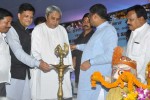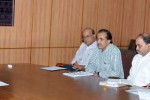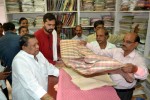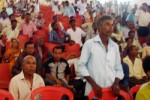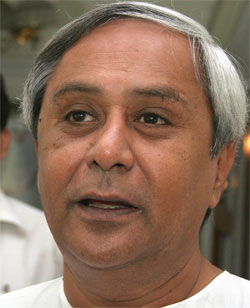 Odisha Channel Bureau Bhubaneswar, Feb 6: Odisha Chief Minister Naveen Patnaik today urged the citizenry in the State including the State machinery to be aware of better nutrition outcomes for a healthy living.“I do hope that with policy and programme inputs from the State and active participation of communities; collectively we can address the nutrition challenge in the State,” Patnaik said while addressing a meeting organised on the occasion of the release of the Global Nutrition Report in Odisha just after its release in New Delhi.The Chief Minister expressed hope that the report will help strengthen nutrition accountability world over.“We all know that good nutrition is not only availability of good food but also extends to disease control, household and environment sanitation, household income and women empowerment, involving multi-sector activities and their interactions,” he observed.Odisha Government has provided and will continue to provide the enabling investment that is required to reduce both the prevalence and incidence of under-nutrition in the State with support from donor partners such as DFID and technical support agencies such as TMST, UNICEF, UNFPA, UNDP, WFP etc, Patnaik said.He informed that the State is implementing various programmes like ICDS, Mid Day Meal and Mamata that supports better nutrition to children, adolescents, pregnant women and lactating mothers. “Besides, we are holistically focusing on health and nutrition across life cycle for addressing the micro and macro nutrient needs.We are also taking big strides in promoting household sanitation and environment hygiene and sanitation by promoting use of toilets through community based approaches.Through the state support, citizenry have been encouraged to make their surroundings open defecation free.We are implementing Shakti Varta for increased community demand and ownership around health, nutrition and water and sanitation programmes.He further said that the State Government was determined to increase the food basket at the household level through our support to Rupee one per KG rice scheme, implementation of the Food Security Act and through farm and agricultural inputs for increased productivity of cereals, pulses, oilseeds and protein rich foods.“I am happy that frontline workers, community members and elected PRI members have been engaged as agents of change for disseminating messages on health, nutrition, water and sanitation and on the whole range of development policies and programmes in the State,” he added.The Global Nutrition Report tracks worldwide progress for all 193 UN countries in improving their nutrition status.By bringing together data on more than 80 nutrition indicators (including programme coverage, underlying determinants such as food security and water, sanitation and hygiene, resource allocations, and political commitments), the report aims to contribute to country-led efforts to strengthen accountability and accelerate the reduction of malnutrition.There is a pressing need for strong leadership across society – in government, civil society, research, private foundations, and business – to achieve this goal.Almost every country in the world, rich or poor, faces a serious public health risk due to malnutrition, either from under nutrition, obesity, or micronutrient deficiencies.New preliminary data from India (2013-2-14 Rapid Survey on Children, RSOC) suggest a faster improvement in the reduction of malnutrition than anticipated stunting for under fives may have declined by over 10 million! Yet, with the lowest rank among 100 countries, India is vulnerable on sanitation and other underlying determinants for under nutrition.Arati Ahuja, Secretary of the Department of Health & Family Welfare, Government of Odisha (and member of the Independent Expert Group for the Global Nutrition Report) stated that “Reduction of under nutrition requires concerted action across the board.Many states in India have made significant interventions in this regard, and the positive results are becoming visible now.” “The Global Nutrition Report aims to contribute to country-led efforts to strengthen accountability, share learning about what is working, and highlight bottlenecks to progress and how they may be overcome,” said Lawrence Haddad, a co-author of the Global Nutrition Report and a senior research fellow at the International Food Policy Research Institute (IFPRI).The benefits of improved nutrition cascade through the lifecycle and across generations, which is why the costs of failing to act are tragically high for all countries.This requires developing stronger accountability mechanisms with better data, more transparency and stronger feedback systems as a vital step towards intensifying commitment and making sure these mechanisms improve nutrition status.This report is a critical first step in that direction.
Odisha Channel Bureau Bhubaneswar, Feb 6: Odisha Chief Minister Naveen Patnaik today urged the citizenry in the State including the State machinery to be aware of better nutrition outcomes for a healthy living.“I do hope that with policy and programme inputs from the State and active participation of communities; collectively we can address the nutrition challenge in the State,” Patnaik said while addressing a meeting organised on the occasion of the release of the Global Nutrition Report in Odisha just after its release in New Delhi.The Chief Minister expressed hope that the report will help strengthen nutrition accountability world over.“We all know that good nutrition is not only availability of good food but also extends to disease control, household and environment sanitation, household income and women empowerment, involving multi-sector activities and their interactions,” he observed.Odisha Government has provided and will continue to provide the enabling investment that is required to reduce both the prevalence and incidence of under-nutrition in the State with support from donor partners such as DFID and technical support agencies such as TMST, UNICEF, UNFPA, UNDP, WFP etc, Patnaik said.He informed that the State is implementing various programmes like ICDS, Mid Day Meal and Mamata that supports better nutrition to children, adolescents, pregnant women and lactating mothers. “Besides, we are holistically focusing on health and nutrition across life cycle for addressing the micro and macro nutrient needs.We are also taking big strides in promoting household sanitation and environment hygiene and sanitation by promoting use of toilets through community based approaches.Through the state support, citizenry have been encouraged to make their surroundings open defecation free.We are implementing Shakti Varta for increased community demand and ownership around health, nutrition and water and sanitation programmes.He further said that the State Government was determined to increase the food basket at the household level through our support to Rupee one per KG rice scheme, implementation of the Food Security Act and through farm and agricultural inputs for increased productivity of cereals, pulses, oilseeds and protein rich foods.“I am happy that frontline workers, community members and elected PRI members have been engaged as agents of change for disseminating messages on health, nutrition, water and sanitation and on the whole range of development policies and programmes in the State,” he added.The Global Nutrition Report tracks worldwide progress for all 193 UN countries in improving their nutrition status.By bringing together data on more than 80 nutrition indicators (including programme coverage, underlying determinants such as food security and water, sanitation and hygiene, resource allocations, and political commitments), the report aims to contribute to country-led efforts to strengthen accountability and accelerate the reduction of malnutrition.There is a pressing need for strong leadership across society – in government, civil society, research, private foundations, and business – to achieve this goal.Almost every country in the world, rich or poor, faces a serious public health risk due to malnutrition, either from under nutrition, obesity, or micronutrient deficiencies.New preliminary data from India (2013-2-14 Rapid Survey on Children, RSOC) suggest a faster improvement in the reduction of malnutrition than anticipated stunting for under fives may have declined by over 10 million! Yet, with the lowest rank among 100 countries, India is vulnerable on sanitation and other underlying determinants for under nutrition.Arati Ahuja, Secretary of the Department of Health & Family Welfare, Government of Odisha (and member of the Independent Expert Group for the Global Nutrition Report) stated that “Reduction of under nutrition requires concerted action across the board.Many states in India have made significant interventions in this regard, and the positive results are becoming visible now.” “The Global Nutrition Report aims to contribute to country-led efforts to strengthen accountability, share learning about what is working, and highlight bottlenecks to progress and how they may be overcome,” said Lawrence Haddad, a co-author of the Global Nutrition Report and a senior research fellow at the International Food Policy Research Institute (IFPRI).The benefits of improved nutrition cascade through the lifecycle and across generations, which is why the costs of failing to act are tragically high for all countries.This requires developing stronger accountability mechanisms with better data, more transparency and stronger feedback systems as a vital step towards intensifying commitment and making sure these mechanisms improve nutrition status.This report is a critical first step in that direction.
February 6, 2015
February 6, 2015
0 Comment
Related Articles:
- 5T Secretary reviews progress on CMO district visit grievance redressal
September 13, 2023, 11:47 am
- Patnaik announces Rs 10 lakhs each to Asian Game qualified Odisha athletes
September 13, 2023, 8:13 am
- Odisha CMO reviews grievances related to industrial development
September 12, 2023, 1:10 pm
- Odisha accelerates economic growth with approval of 9 key industrial projects
September 12, 2023, 4:02 am
- Odisha government is committed to welfare of animals: Patnaik
September 8, 2023, 4:18 pm
- Naveen Patnaik felicitates visually-challenged cricket players
September 8, 2023, 2:59 pm
- Odisha panchayat polls: Landslide victory for BJD, BJP distant second
March 1, 2022, 12:33 pm
- Hemananda Biswal: An inspiration for tribal leaders of Odisha
February 26, 2022, 5:17 am
- Hemananda Biswal passes away, to be cremated at his native place
February 26, 2022, 5:10 am
- Urban civic polls in Odisha to be held on March 24
February 25, 2022, 6:03 pm
Breaking News:
- Man Sues Dealership After Loaner Car Gets Reported as Stolen
April 25, 2024, 1:02 pm - Southwest will limit hiring and drop 4 airports after loss. American Airlines posts 1Q loss as well
April 25, 2024, 11:18 am - People Are Cackling At Monica Lewinsky's 'Iconic' Take On The Taylor Swift Meme
April 25, 2024, 9:35 am - Frontline Ukrainians Fear New Aid From U.S. Will Be a Disaster
April 25, 2024, 8:38 am - 'How Embarrassing': Trump Mocked For 'Pretending To Be President' In Strange Ceremony
April 25, 2024, 8:29 am - Trump Attorney Alina Habba Makes Blunt Admission About Trial, But It’s No Surprise
April 25, 2024, 8:25 am - 'Killer Clown' John Wayne Gacy's death row attorney reveals why he likely had dozens more victims — and help
April 25, 2024, 8:00 am - Trump Throws Absolute Fit In Late Night Rant For The Strangest Possible Reason
April 25, 2024, 7:18 am - 'I Shouldn't Have Said That': Joe Biden Mocks 1 Of Trump's Most Cherished Traits
April 25, 2024, 4:32 am - Hamas official says group would lay down its weapons if a two-state solution is implemented
April 25, 2024, 4:26 am







